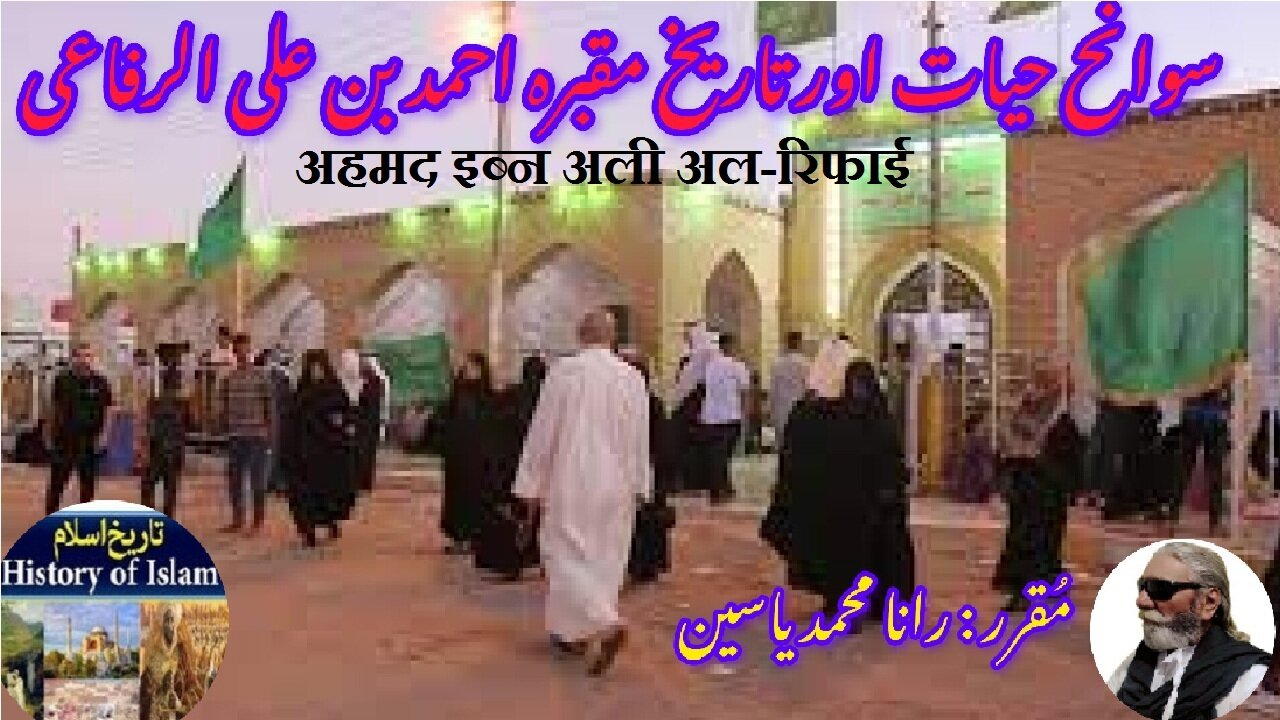Premium Only Content

Ahmad ibn Ali al-Rifai |अहमद इब्न अली अल-रिफाई | احمد بن علی الرفاعی کی سوانح عمری اور مزار کی تاریخ
@islamichistory813 #biography #ahmadibnali #alrifai #sufisaint #cultural #heritage #biography #islamic #mysticism #islamic #philosophy #shrine #historical #figures
Biography of Ahmad ibn Ali al-Rifai and the history of his shrine
Dekhti Aankhooon aur sountay kaanoon ko Asslamoalaikum, sisters, brothers friends and elders, in informative series videos of Islamic ascolars, sufisaints, cultural heritages, islamic philosophys, islamic mysticisms and historical figures. today we are describing biography of Ahmad ibn Ali al-Rifai and the history of his shrine.
Ahmad ibn Ali al-Rifa'i, a prominent Sunni Muslim preacher, ascetic, mystic, jurist, and theologian, was born in the first half of the lunar month of Rajab, around 1106 CE, in the Hasnain area of the city of al-Wasiyyah, Iraq. He is renowned as the founder of the Rifa’i order, a Sufi path that gained immense popularity in the Arab Middle East and later expanded to regions such as Turkey, the Balkans, and South Asia. The Rifa’i order, which emphasized asceticism, spiritual discipline, and deep devotion to God, eventually became one of the largest Sufi orders, though it was later surpassed by the Qadri order in terms of its global following. Ahmad al-Rifa'i’s legacy, however, endures in both his teachings and the religious order he founded, which continues to influence millions of people around the world. His tomb and shrine, located in the town of al-Rifa'i near Baghdad, Iraq, remain significant spiritual sites that attract thousands of devotees seeking blessings and spiritual enlightenment.
From an early age, Ahmad al-Rifa’i’s life was shaped by tragedy and devotion. When he was just seven years old, his father, Sayyid Sultan Ali al-Bathi, passed away in Baghdad. This early loss could have led Ahmad into a life of difficulty and despair, but instead, it marked the beginning of his profound spiritual journey. Following his father’s death, he was placed under the guardianship of his uncle, Sheikh Mansur al-Rabbani al-Bathi, a respected religious figure and Sufi scholar. Sheikh Mansur became Ahmad’s spiritual mentor and guide, instilling in him the deep principles of Sufism, including ascetic practices, meditation, and the cultivation of a pure heart devoted entirely to God. Under the tutelage of his uncle, Ahmad’s knowledge of Islamic jurisprudence, theology, and mysticism grew, and he began to develop his own spiritual insights, which would later serve as the foundation for his work in establishing the Rifa’i order.
As a young man, Ahmad al-Rifa’i was drawn to the spiritual and mystical dimensions of Islam, seeking to attain a closer connection with God through ascetic practices. He rejected the material comforts of the world and chose to live a life of simplicity, dedicating himself to prayer, fasting, and deep meditation. His devotion to God was so profound that it was said he could perform miraculous feats, which led many people to regard him as a saintly figure. His teachings emphasized not just outward religious practice, but the importance of inner purification and self-discipline, which were the hallmarks of his Sufi philosophy. Ahmad’s reputation as a mystic and spiritual leader spread far and wide, attracting a large following of disciples who were inspired by his commitment to spiritual asceticism and divine love.
One of the key aspects of Ahmad al-Rifa’i’s teachings was his emphasis on the importance of *tawhid* (the oneness of God) and the deep, unshakable love for God, which he believed should be the central focus of every believer’s life. He advocated for a life of humility, where one could focus entirely on worship and the service of others, while seeking to detach oneself from the distractions and desires of the material world. His emphasis on inner purity and spiritual awareness, alongside the practice of intense devotion to God, became the core tenets of the Rifa’i order. The order itself was built around strict rules of asceticism and the idea that the ultimate goal of a believer was to achieve complete submission to God’s will and to live a life free of pride, ego, and worldly attachments.
Ahmad al-Rifa’i’s contributions to Sufism went beyond his teachings, however. He was instrumental in organizing the Rifa’i order and helping it expand throughout the Arab Middle East. His followers, known as the Rifa’i Sufis, became known for their deep spiritual devotion and their strict adherence to the Sufi principles of asceticism and humility. They practiced rituals that included meditation, prayer, and the chanting of specific invocations, all designed to help the practitioner draw closer to God and cultivate a purified heart. The Rifa’i order became one of the most influential Sufi orders of its time, with followers across the Middle East, North Africa, and parts of Asia. Even though the Qadri order eventually surpassed it in terms of global influence, the Rifa’i order remained a significant force in the world of Sufism and Islamic spirituality.
The tomb and shrine of Ahmad al-Rifa’i, located in the town of al-Rifa’i near Baghdad, are among the most revered religious sites in Iraq. After his death in 1182 CE, Ahmad al-Rifa’i’s followers constructed a shrine to honor him and preserve his memory. The shrine has become a place of pilgrimage for those seeking spiritual blessings and guidance. Thousands of devotees from all over the world visit the site to pay homage to the saint and to reflect on his teachings. The mosque built around his tomb is known as the *al-Rifa'i Mosque*, and it remains a symbol of the Rifa’i order’s continued presence in the region. The mosque’s architecture is a reflection of the region’s Islamic heritage, with intricate designs and serene courtyards that create an atmosphere of spiritual tranquility for visitors. The shrine continues to be a major destination for those who wish to connect with Ahmad al-Rifa’i’s legacy and seek blessings through his intercession.
In conclusion, Ahmad ibn Ali al-Rifa’i’s life and teachings have had a profound impact on the development of Sufism and the broader Islamic tradition. As the founder of the Rifa’i order, he helped shape the direction of Islamic mysticism by emphasizing asceticism, devotion, and the importance of inner spiritual purity. His followers, through the Rifa’i order, spread his teachings across the Arab world, and his influence continued to be felt in Turkey, the Balkans, and South Asia. Today, his tomb and shrine in the town of al-Rifa’i remain an important place of pilgrimage, and his teachings continue to inspire countless people who seek to deepen their connection with God and lead lives of humility, devotion, and spiritual discipline.
With this, we seek your permission until tomorrow, tomorrow we will describe the biography of Shah Rukn-ul-Alam and the history of his Shrine.
=========================
-
 0:08
0:08
ISLAMIC HISTORY
15 hours agoWhy is the Battle of Badr important in Islam اسلام میں جنگ بدر کی اہمیت کیوں ہے ؟
1 -
 LIVE
LIVE
Price of Reason
7 hours agoTrump FIRES Fed Governor Lisa Cook! Cracker Barrel CRISIS Continues! James Gunn DCU Woes! Gamescon!
5,380 watching -
 LIVE
LIVE
FreshandFit
1 hour agoTyreek Hill Pays Ex Wife $1 Million in Ongoing Fees From Divorce?!
3,379 watching -
 LIVE
LIVE
Inverted World Live
3 hours agoHaunted Dolls Hack Amazon Alexa | Ep. 98
9,888 watching -
 LIVE
LIVE
Laura Loomer
4 hours agoEP140: Loomer EXPOSES Islamification At US State Department
927 watching -
 3:05:00
3:05:00
TimcastIRL
4 hours agoTrump Floats Accepting 600,000 Chinese Student Visas, MAGA Uproar | Timcast IRL
166K95 -

SpartakusLIVE
9 hours ago$20,000 Hide and Seek Tourney w/ Stonemountain64 || #1 Rat wins the BIG CHEESE
49.3K -
 2:34:02
2:34:02
Barry Cunningham
4 hours agoLISA COOK | ADAM SCHIFF | LETITIA JAMES | ARE THEY BEING SACRIFICED BY THE DEEP STATE?
68.4K38 -
 1:36:19
1:36:19
Flyover Conservatives
13 hours agoOnly 17% of Millennials Hit These 5 Adult Milestones—Why?; What If Childhood Trauma Is Behind Your Health Problems? - Dr. Troy Spurrill | FOC Show
18.6K3 -
 4:49:04
4:49:04
HogansAlleyHero
14 hours ago💥CHASING DOPAMINE💥✅TRUMP SAYS BATTLEFIELD IS THE BEST✅
24.7K1